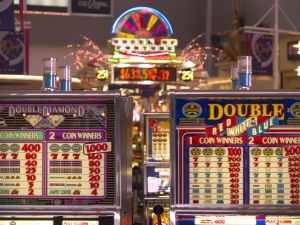Gambling is an addiction, a form of insanity, when the urge becomes overwhelming and we can't control ourselves. We may end up spending money we actually needed for buying food or paying the rent and sending the kids to school. Mind you, there is nothing wrong with the occasional game, as part of a social get-together, even if we play for money. But when the urge becomes a compulsion and we spend entire days without being unable to unhook ourselves, alarm bells should go off.

Las Vegas - Photo credit: Phil Landowski
Can pharmaceutical drugs stimulate the gambler in us? Apparently yes. Mirapex, an Alzheimer's drug, has been linked to the gambling habit in people who were "straight" before and became unable to stay away from slot machines or gambling tables once they had filled their prescription.
Question: Should such side effects not be cause for concern - for removing the drug from the market and finding better ways to prevent Alzheimer's?
Here is an article by Evelyn Pringle who describes what happened to two of the victims.
- - -
Mirapex - Two Victims - Same Horror Story
by Evelyn Pringle
(original on www.opednews.com)
In mid-2001, Joe Neglia went on a cruise to Alaska and that trip marked the beginning of his downward spiral into hell. The ship had a gambling casino on board and according to Joe, he was "instantly and savagely hooked on the slots."
A major problem arose when he came back ashore. "When I returned from the cruise I began hitting the local casinos," he recalls, "there were three within 25 minutes from my home."
"I hit them every day," he said, "frequently all day for two full years."
The daily gambling binges continued for two full years because that's how long it took for Joe to find out that, Mirapex, the drug he had been taking for Parkinson's disease, had turned him into a compulsive gambler.
Jim Sweet recounts a similar version of basically the same tragic tale. He began taking Mirapex in December of 1998.
"A couple of months later I found myself on my computer a lot," he says, "bidding in auctions on stuff that I didn't need."
Next Jim then turned to gambling online, "running up thousands of dollars in credit card debt."
Like Joe Neglia, Jim never had a gambling problem before taking Mirapex.
As the dosage of the drug was increased, Jim's compulsive behavior increased. Over time, he reveals, "the gambling addiction escalated to include casinos, race track betting, lottery, and more online betting."
"I went through a living hell for over three years while on Mirapex, with a drug induced gambling addiction," he recalls.
For those unfamiliar with this controversy, as remarkable as it may seem, recent studies have shown that Mirapex is indeed the culprit here. On February 15, 2006, United Press International, reported: "Parkinson's disease patients who take anti-tremor drugs are at greater risk of becoming pathological gamblers," based on a study by Duke University and three FDA scientists. The study is discussed in the February 2006, Archives of Neurology.